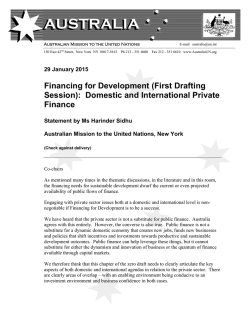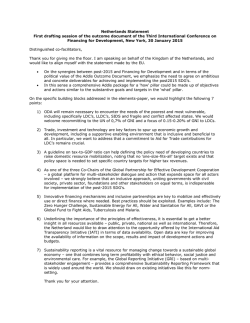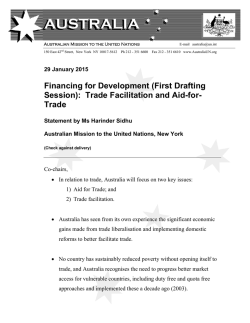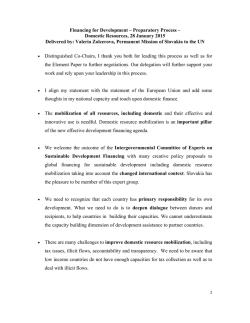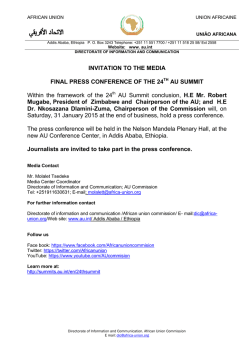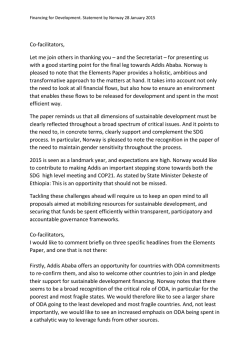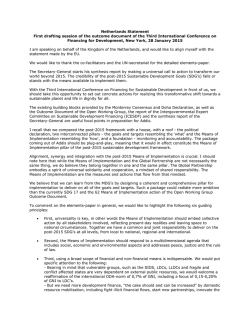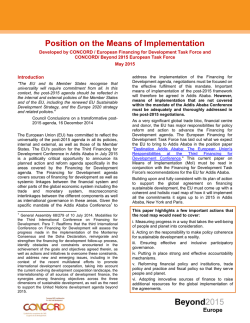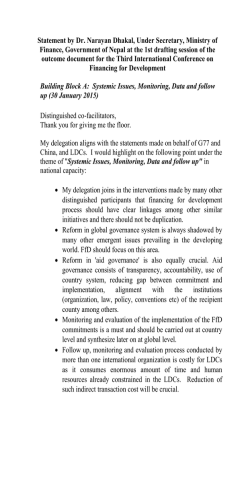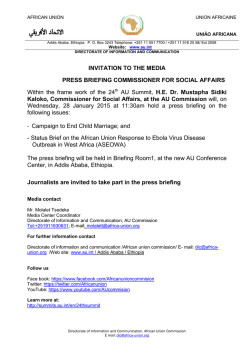
AUSTRALIA
AUSTRALIA AUSTRALIA Australian Mission to the United Nations 150 East 42nd Street, New York NY 10017-5612 Ph 212 - 351 6600 E-mail [email protected] Fax 212 - 351 6610 www.AustraliaUN.org 28 January 2015 Financing for Development (First Drafting Session): Domestic Public Finance Statement delivered by Ms Harinder Sidhu Australian Mission to the United Nations, New York (Check against delivery) Co-chairs Domestic resources are the most sustainable and reliable form of long-term financing to support resilient economic growth. Domestic public finance is the largest public financial flow, with estimates in developing countries ranging from $1.86 trillion (ICESDF report) to $7.7 trillion (World Bank) each year. Domestic public finance provides a foundation on which governments can plan their recurrent expenditure, finance infrastructure and encourage job growth. Domestic resource mobilisation is an area where significant gains can be made regardless of the countries income category. Momentum in this area is a win-win for every country in this room. -2- In the elements paper we need to: Promote tax reform, tax compliance and deeper cooperation (ICESDF report, p 17) Ensure good financial governance and public financial management (ICESDF report, p 19) Address inequity and promote financial protection (ICESDF report, p 20), particularly utilising gender financing to target women and girls as being fundamental to effective sustainable development Effectively manage public debt (ICESDF report, p 22) Explore institutional options that promote long-term investment and therefore can be geared towards sustainable development objectives, such as national development banks and other public institutions (ICESDF report, p 22). We see that Addis would need to draw threads between these important elements, reflecting that solutions in this area require the consolidation of the work of many. But it must start and end at the country level, because that is rightfully where political control of the people sits and it is also where reforms must be implemented. -3- But collaboration is important at both the country and at the international level. At the country level Australia has worked closely with the Solomon Islands Government as well as regional partners over the past 12 years to stabilise that country from conflict, and support long term governance, revenue and tax compliance. In 2003, tax revenues were only $379 million , however following a range of supporting programs and tax support this was increased to $1.34 billion by 2011. We also commend the Solomon Islands on their recent successful election in November 2014, and the ongoing sustainable development benefits that can be received from the linkage between stable governance, good public management and financing for development.1 At the international level, partnership can also be seen in the critical area of tax cooperation. We can identify a range of actions for Addis , including building on key outcomes from Australia’s G20 Presidency, including: bringing international tax rules into the 21st century by implementing a two-year action plan on tax avoidance and endorsing a Common Reporting Standard on the automatic exchange of tax information 1 http://foreignminister.gov.au/releases/Pages/2014/jb_mr_141117.aspx -4- (AEOI) that will arm tax authorities around the world to identify tax cheats and enforce tax laws learning from the common impacts that Base Erosion Profit Shifting (BEPS) has on domestic resource mobilisation and work together with key parties including the UN, IMF, OECD and World Bank to build engagement across member states and build common standards. These national and international efforts have the power to transform governments into better resourced and stronger institutionally. Mapping out a pathway to capture, scale up and implement these changes should be the focus of our collective efforts towards Addis. Thank you.
© Copyright 2026
